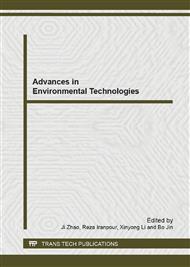p.4095
p.4101
p.4109
p.4115
p.4119
p.4123
p.4131
p.4135
p.4142
Research on Sustainable Development of Ecology Based on Ecological Footprint Theory - Case Study of Liaocheng City in ShanDong Province
Abstract:
Ecological footprint theory is used to evaluate the eco-environmental conditions by calculating the area of regional productive land. The research would estimate the environmental sustainability of the lifestyle of residents in Liaocheng city using the ecological footprint as the indicator of consumption. At first, the related conceptions of ecological footprint will be introduced, then analysis the disparity between consumption demand and available supply on the basis on data from statistical yearbook of Shandong Province in 2011. The result shows that the ecological footprint exceeds 27.9 times of ecological carrying capacity which indicate that the city was in unsustainable situation in 2011.
Info:
Periodical:
Pages:
4119-4122
Citation:
Online since:
August 2013
Authors:
Price:
Сopyright:
© 2013 Trans Tech Publications Ltd. All Rights Reserved
Share:
Citation:


